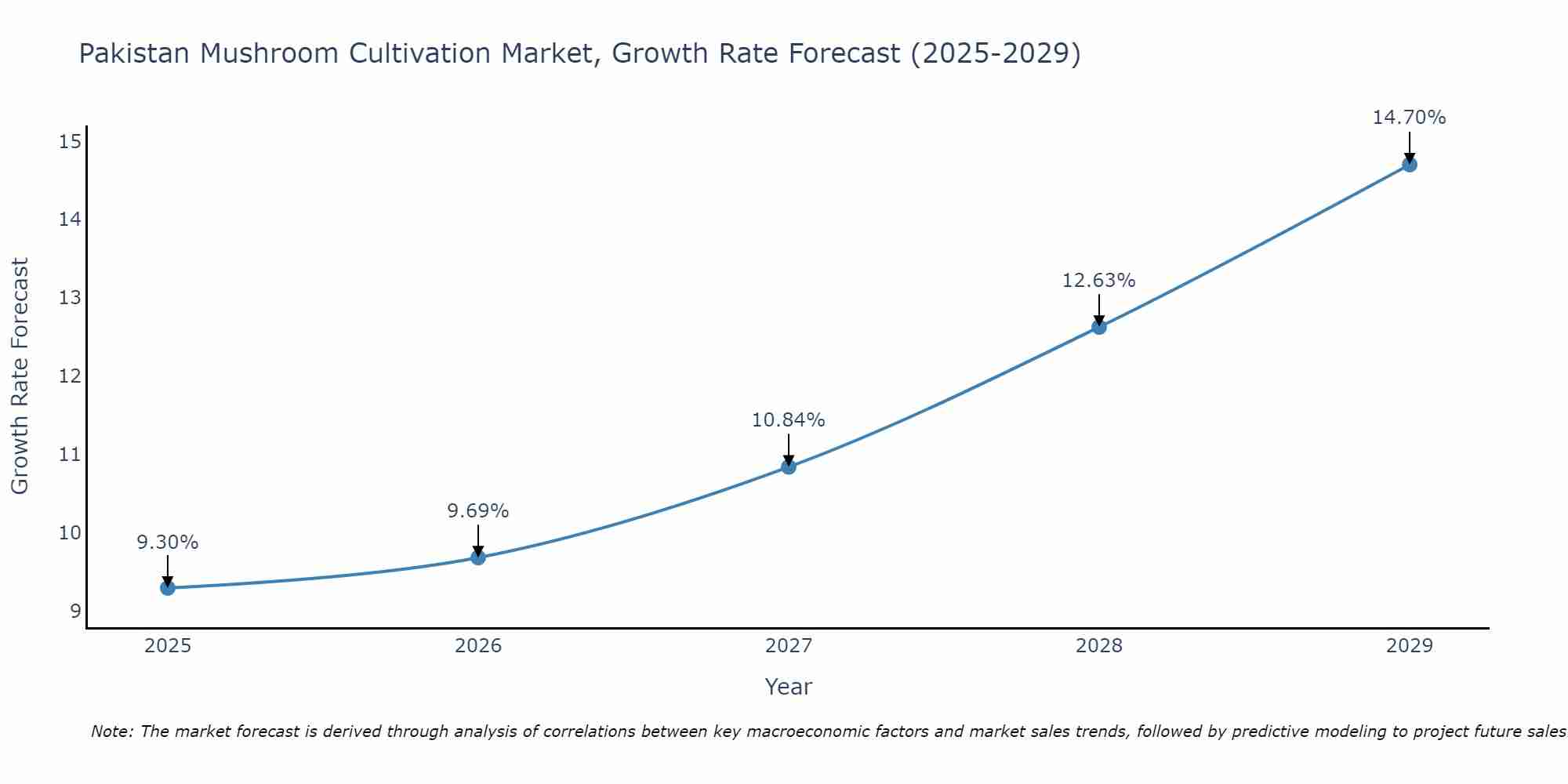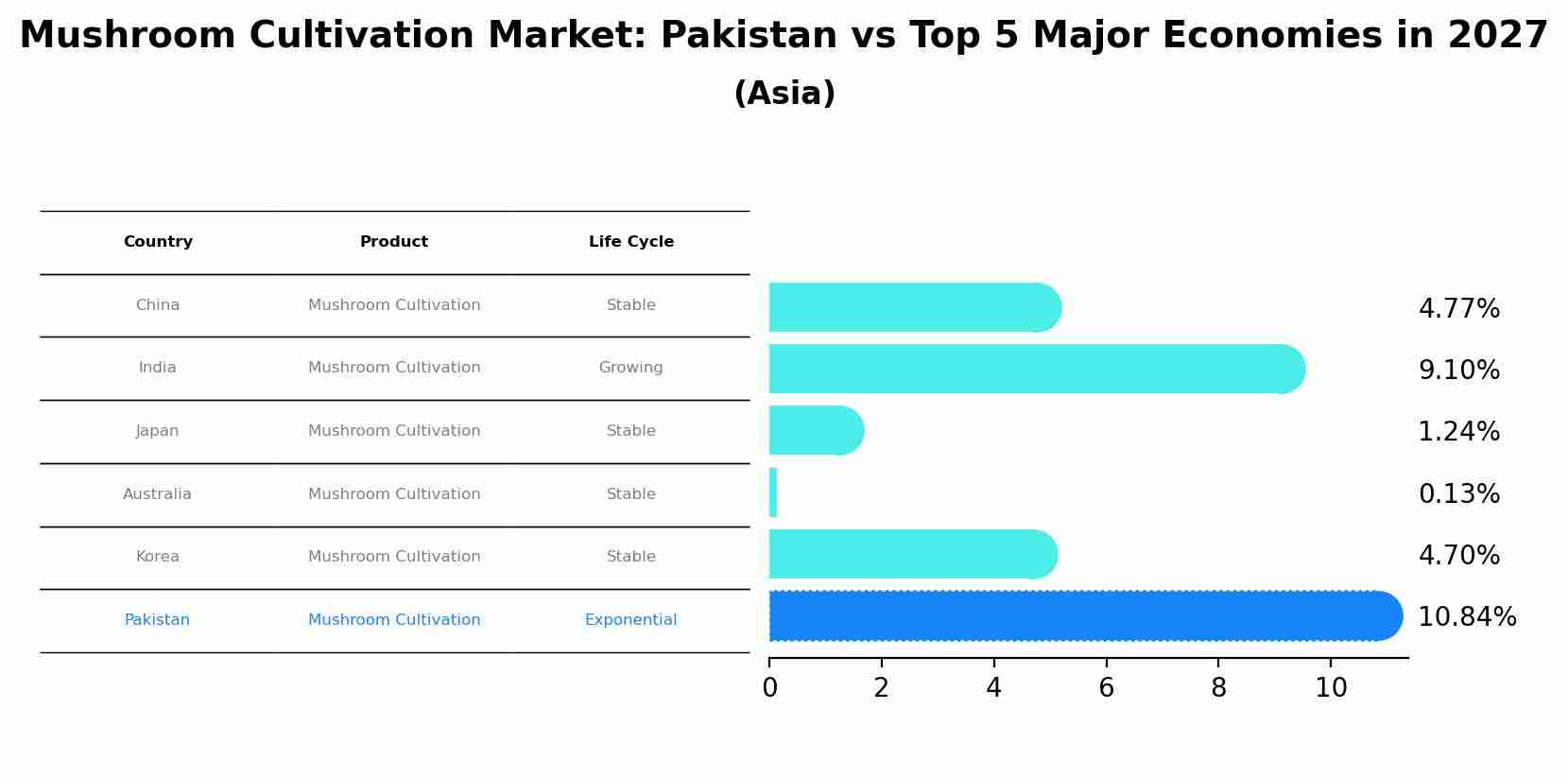Pakistan Mushroom Cultivation Market (2025-2031) Outlook | Size, Trends, Value, Analysis, Share, Forecast, Growth, Companies, Revenue & Industry
| Product Code: ETC383137 | Publication Date: Aug 2022 | Updated Date: Sep 2025 | Product Type: Market Research Report | |
| Publisher: 6Wresearch | Author: Shubham Padhi | No. of Pages: 75 | No. of Figures: 35 | No. of Tables: 20 |
Pakistan Mushroom Cultivation Market Size Growth Rate
The Pakistan Mushroom Cultivation Market is likely to experience consistent growth rate gains over the period 2025 to 2029. The growth rate starts at 9.30% in 2025 and reaches 14.70% by 2029.

Mushroom Cultivation Market: Pakistan vs Top 5 Major Economies in 2027 (Asia)
By 2027, the Mushroom Cultivation market in Pakistan is anticipated to reach a growth rate of 10.84%, as part of an increasingly competitive Asia region, where China remains at the forefront, supported by India, Japan, Australia and South Korea, driving innovations and market adoption across sectors.

Pakistan Mushroom Cultivation Market Overview
The Mushroom Cultivation Market in Pakistan is growing as the demand for mushrooms as a nutritious food source increases. This market includes various types of mushrooms, such as button, oyster, and shiitake, and involves activities related to their farming, processing, and distribution.
Drivers of the market
The mushroom cultivation market in Pakistan is driven by the growing demand for nutritious and flavorful mushrooms, coupled with favorable climatic conditions and increasing awareness of the health benefits associated with mushroom consumption. Mushrooms are rich in protein, vitamins, minerals, and antioxidants, making them a popular choice among health-conscious consumers. With rising disposable incomes, changing dietary preferences, and the expansion of urban populations, the demand for mushrooms as a culinary ingredient and functional food is increasing in Pakistan. Additionally, advancements in cultivation techniques, such as controlled environment agriculture and organic farming practices, are driving market growth by enhancing yield, quality, and sustainability in mushroom production.
Challenges of the market
Challenges in the mushroom cultivation market include limited awareness and knowledge about advanced cultivation techniques among farmers. Additionally, the high cost of quality spawn and limited availability of training and support services hinder market growth.
Government Policy of the market
Recognizing the potential of mushroom cultivation in addressing food security and generating rural employment, the government supports initiatives to promote mushroom farming. Policies focus on providing training, financial assistance, and infrastructure support to mushroom growers, particularly in rural areas. Regulatory frameworks address quality standards, market access, and export opportunities to stimulate growth in the mushroom cultivation market.
Key Highlights of the Report:
- Pakistan Mushroom Cultivation Market Outlook
- Market Size of Pakistan Mushroom Cultivation Market, 2024
- Forecast of Pakistan Mushroom Cultivation Market, 2031
- Historical Data and Forecast of Pakistan Mushroom Cultivation Revenues & Volume for the Period 2021-2031
- Pakistan Mushroom Cultivation Market Trend Evolution
- Pakistan Mushroom Cultivation Market Drivers and Challenges
- Pakistan Mushroom Cultivation Price Trends
- Pakistan Mushroom Cultivation Porter's Five Forces
- Pakistan Mushroom Cultivation Industry Life Cycle
- Historical Data and Forecast of Pakistan Mushroom Cultivation Market Revenues & Volume By Type for the Period 2021-2031
- Historical Data and Forecast of Pakistan Mushroom Cultivation Market Revenues & Volume By Button Mushroom for the Period 2021-2031
- Historical Data and Forecast of Pakistan Mushroom Cultivation Market Revenues & Volume By Oyster Mushroom for the Period 2021-2031
- Historical Data and Forecast of Pakistan Mushroom Cultivation Market Revenues & Volume By Shiitake Mushroom for the Period 2021-2031
- Historical Data and Forecast of Pakistan Mushroom Cultivation Market Revenues & Volume By Others for the Period 2021-2031
- Pakistan Mushroom Cultivation Import Export Trade Statistics
- Market Opportunity Assessment By Type
- Pakistan Mushroom Cultivation Top Companies Market Share
- Pakistan Mushroom Cultivation Competitive Benchmarking By Technical and Operational Parameters
- Pakistan Mushroom Cultivation Company Profiles
- Pakistan Mushroom Cultivation Key Strategic Recommendations
Frequently Asked Questions About the Market Study (FAQs):
- Single User License$ 1,995
- Department License$ 2,400
- Site License$ 3,120
- Global License$ 3,795
Search
Thought Leadership and Analyst Meet
Our Clients
Related Reports
- Afghanistan Apparel Market (2026-2032) | Growth, Outlook, Industry, Segmentation, Forecast, Size, Companies, Trends, Value, Share, Analysis & Revenue
- Canada Oil and Gas Market (2026-2032) | Share, Segmentation, Value, Industry, Trends, Forecast, Analysis, Size & Revenue, Growth, Competitive Landscape, Outlook, Companies
- Germany Breakfast Food Market (2026-2032) | Industry, Share, Growth, Size, Companies, Value, Analysis, Revenue, Trends, Forecast & Outlook
- Australia Briquette Market (2025-2031) | Growth, Size, Revenue, Forecast, Analysis, Trends, Value, Share, Industry & Companies
- Vietnam System Integrator Market (2025-2031) | Size, Companies, Analysis, Industry, Value, Forecast, Growth, Trends, Revenue & Share
- ASEAN and Thailand Brain Health Supplements Market (2025-2031) | Strategy, Consumer Insights, Analysis, Investment Trends, Opportunities, Growth, Size, Share, Industry, Revenue, Segments, Value, Segmentation, Supply, Forecast, Restraints, Outlook, Competition, Drivers, Trends, Demand, Pricing Analysis, Competitive, Strategic Insights, Companies, Challenges
- ASEAN Bearings Market (2025-2031) | Strategy, Consumer Insights, Analysis, Investment Trends, Opportunities, Growth, Size, Share, Industry, Revenue, Segments, Value, Segmentation, Supply, Forecast, Restraints, Outlook, Competition, Drivers, Trends, Demand, Pricing Analysis, Competitive, Strategic Insights, Companies, Challenges
- Europe Flooring Market (2025-2031) | Outlook, Share, Industry, Trends, Forecast, Companies, Revenue, Size, Analysis, Growth & Value
- Saudi Arabia Manlift Market (2025-2031) | Outlook, Size, Growth, Trends, Companies, Industry, Revenue, Value, Share, Forecast & Analysis
- Uganda Excavator, Crane, and Wheel Loaders Market (2025-2031) | Strategy, Consumer Insights, Analysis, Investment Trends, Opportunities, Growth, Size, Share, Industry, Revenue, Segments, Value, Segmentation, Supply, Forecast, Restraints, Outlook, Competition, Drivers, Trends, Demand, Pricing Analysis, Competitive, Strategic Insights, Companies, Challenges
Industry Events and Analyst Meet
Whitepaper
- Middle East & Africa Commercial Security Market Click here to view more.
- Middle East & Africa Fire Safety Systems & Equipment Market Click here to view more.
- GCC Drone Market Click here to view more.
- Middle East Lighting Fixture Market Click here to view more.
- GCC Physical & Perimeter Security Market Click here to view more.
6WResearch In News
- Doha a strategic location for EV manufacturing hub: IPA Qatar
- Demand for luxury TVs surging in the GCC, says Samsung
- Empowering Growth: The Thriving Journey of Bangladesh’s Cable Industry
- Demand for luxury TVs surging in the GCC, says Samsung
- Video call with a traditional healer? Once unthinkable, it’s now common in South Africa
- Intelligent Buildings To Smooth GCC’s Path To Net Zero


















